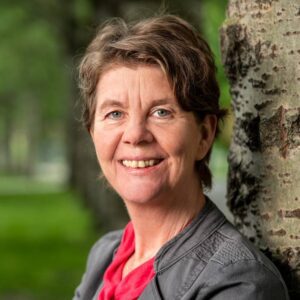
MS lesions are still very active in late stages of the disease
2 March 2018

2 March 2018
Lesions in the brains of people with multiple sclerosis (MS) are much more active during the late stages of the disease than was previously thought. This is the conclusion of a team of neuroscientists led by Inge Huitinga of the Netherlands Institute for Neuroscience, based on research with post mortem brain tissue that was donated to the Netherlands Brain Bank. This finding, published in the scientific journal Acta Neuropathologica, offers a new perspective in terms of prognosis and development of therapies for people with advanced MS.
“These results change our current understanding of MS,” says Huitinga. Until recently it was assumed that the lesion inflammatory activity decreased considerably with the progression of the disease. However, it now turns out that the lesions are much more active in the late stages of MS than was suggested by earlier research. At the time of death, the number of active lesions appears to be higher in MS patients with a more severe course of the disease. Also, men with MS have many more active lesions than women with MS. This would explain why the disease often has a more severe course in men.
With financial aid from the Vriendenloterij and the Stichting MS Research, the Netherlands Brain Bank for MS (NBB-MS) has examined the brains of over 180 MS brain donors in terms of number and activity of MS lesions, and has linked it to the course of the disease of the donors. Huitinga: “What now needs to happen is that the scanning techniques are optimized so that the inflammatory activity in MS can be made visible. In this way it can be determined whether the course of the disease during life is indeed connected with the inflammatory activity”. This is expected to enable a better prognosis and development of therapies to target these MS lesions.
This research shows the crucial importance of studying human brain tissue after death to identify the changes that occur at the cellular and molecular level in brain diseases such as MS.
In people with MS, lesions occur in the brain in which myelin, the isolating layer around the nerve cells, is destroyed. Without this isolating layer, nerve cells cannot communicate with each other. As a consequence, it affects a patient’s ability to walk, their sense of touch, their speech and their cognitive abilities. The course of the disease varies per patient and is difficult to predict. There is currently no cure.
About the Netherlands Brain Bank
The Netherlands Brain Bank (NBB) collects well-documented brain tissue for scientific research projects all over the world from deceased brain donors who have registered during life. NBB-MS is a project within the NBB that is dedicated to multiple sclerosis. The NBB is part of the Netherlands Institute of Neuroscience, an institute of the Royal Netherlands Academy of Arts and Sciences (KNAW). It carries out fundamental and strategic scientific research in the field of neuroscience.
About Stichting MS Research
Stichting MS Research has as its main aim the encouraging and funding of scientific research into the disease multiple sclerosis in adults and children. It also informs a broad audience about the scientific, medical and societal aspects of MS. Investing in research has enabled a better MS diagnosis, a better mapping of the course of the disease and better treatment and quality of care for people with MS.
About the VriendenLoterij
The VriendenLoterij backs social initiatives that support people who have insufficient means or possibilities, helping them to fully participate in society and lead a full life. It also supports volunteers with an ambition to contribute to society. The lottery raises funds for charities that are involved in health and welfare, and helps to publicize their work.

The Friends Foundation facilitates groundbreaking brain research. You can help us with that.
Support our work